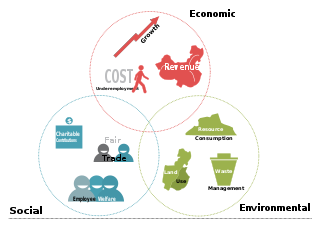Related Research Articles
Marketing is the study and management of exchange relationships. It is the business process of identifying, anticipating and satisfying customers' needs and wants. Because marketing is used to attract customers, it is one of the primary components of business management and commerce. Marketers can direct product to other businesses or directly to consumers.

The triple bottom line is an accounting framework with three parts: social, environmental and financial. Some organizations have adopted the TBL framework to evaluate their performance in a broader perspective to create greater business value. Business writer John Elkington claims to have coined the phrase in 1994.

Corporate social responsibility (CSR) is a type of international private business self-regulation that aims to contribute to societal goals of a philanthropic, activist, or charitable nature by engaging in or supporting volunteering or ethically-oriented practices. While once it was possible to describe CSR as an internal organisational policy or a corporate ethic strategy, that time has passed as various international laws have been developed and various organisations have used their authority to push it beyond individual or even industry-wide initiatives. While it has been considered a form of corporate self-regulation for some time, over the last decade or so it has moved considerably from voluntary decisions at the level of individual organisations, to mandatory schemes at regional, national and international levels.
Ethical consumerism is a type of consumer activism based on the concept of dollar voting. It is practiced through the buying of ethically-made products that support small scale manufacturers and local artisans while protecting animals and the environment, and boycott' products that exploit children as workers, are tested on animals, or damage the environment.
An activist shareholder is a shareholder that uses an equity stake in a corporation to put pressure on its management. A fairly small stake may be enough to launch a successful campaign. In comparison, a full takeover bid is a much more costly and difficult undertaking. The goals of activist shareholders range from financial to non-financial. Shareholder activists can address self-dealing by corporate insiders, although large stockholders can also engage in self-dealing to themselves at the expense of smaller minority shareholders.
A prosumer is a person who consumes and produces a product. The term is derived from prosumption, a dot-com era business term meaning "production by consumers". These terms were coined in 1980 by American futurist Alvin Toffler, and were widely used by many technology writers of the time. The term has since come to refer to a person using commons-based peer production. Technological breakthrough has fastened the development of prosumption. With the help of additive manufacturing techniques, for example, co-creation takes place at different production stages: design, manufacturing and distribution stages. It also takes place between individual customers, leading to co-design communities. Similarly, mass customisation is often associated with the production of tailored goods or services on a large scale production. This increase in participation has flourished following the increasing popularity of Web 2.0 technologies, such as Instagram, Facebook, Twitter and Flickr. This rise in user participation blurs the line between production and consumption activities, with the consumer becoming a prosumer.

Philip Kotler is an American marketing author, consultant, and professor; currently the S. C. Johnson & Son Distinguished Professor of International Marketing at the Kellogg School of Management at Northwestern University. He gave the definition of marketing mix. He is the author of over 60 marketing books, including Marketing Management, Principles of Marketing, Kotler on Marketing, Marketing Insights from A to Z, Marketing 4.0, Marketing Places, Marketing of Nations, Chaotics, Market Your Way to Growth, Winning Global Markets, Strategic Marketing for Health Care Organizations, Social Marketing, Up and Out of Poverty, and Winning at Innovation. Kotler describes strategic marketing as serving as "the link between society's needs and its pattern of industrial response."
Added value in financial analysis of shares is to be distinguished from value added. It is used as a measure of shareholder value, calculated using the formula:
Anti-consumerism is a sociopolitical ideology that is opposed to consumerism, the continual buying and consuming of material possessions. Anti-consumerism is concerned with the private actions of business corporations in pursuit of financial and economic goals at the expense of the public welfare, especially in matters of environmental protection, social stratification, and ethics in the governing of a society. In politics, anti-consumerism overlaps with environmental activism, anti-globalization, and animal-rights activism; moreover, a conceptual variation of anti-consumerism is post-consumerism, living in a material way that transcends consumerism.
Value in marketing, also known as customer-perceived value, is the difference between a prospective customer's evaluation of the benefits and costs of one product when compared with others. Value may also be expressed as a straightforward relationship between perceived benefits and perceived costs: Value = Benefits / Cost.
A target audience is the intended audience or readership of a publication, advertisement, or other message. In marketing and advertising, it is a particular group of consumers within the predetermined target market, identified as the targets or recipients for a particular advertisement or message. Businesses that have a wide target market will focus on a specific target audience for certain messages to send, such as The Body Shops Mother's Day advertisements, which were aimed at the children and spouses of women, rather than the whole market which would have included the women themselves.

Socially responsible investing (SRI), or social investment, also known as sustainable, socially conscious, "green" or ethical investing, is any investment strategy which seeks to consider both financial return and social/environmental good to bring about social change regarded as positive by proponents.
Global marketing is “marketing on a worldwide scale reconciling or taking commercial advantage of global operational differences, similarities and opportunities in order to meet global objectives".
The societal marketing is a marketing concept that holds that a company should make marketing decisions not only by considering consumers' wants, the company's requirements, but also society's long-term interests.
The market environment or business environment is a marketing term and refers to factors and forces that affect a firm's ability to build and maintain successful customer relationships. The business environment has been defined as "the totality of physical and social factors that are taken directly into consideration in the decision-making behaviour of individuals in the organisation."
Socially responsible marketing is a marketing philosophy that a company should take into consideration; "What is in the best interest of society in the present and long term?"

A boycott is an act of voluntary and intentional abstention from using, buying, or dealing with a person, organization, or country as an expression of protest, usually for moral, social, political, or environmental reasons. The purpose of a boycott is to inflict some economic loss on the target, or to indicate a moral outrage, to try to compel the target to alter an objectionable behavior.

See also brand activism

Activism consists of efforts to promote, impede, direct, or intervene in social, political, economic, or environmental reform with the desire to make changes in society. Forms of activism range from mandate building in the community, petitioning elected officials, running or contributing to a political campaign, preferential patronage of businesses, and demonstrative forms of activism like rallies, street marches, strikes, sit-ins, or hunger strikes.
Brand activism is the type of activism in which business plays a leading role in the processes of social change. Applying brand activism, businesses show concern not for the profits but for the communities they serve, and their economic, social, and environmental problems, which allows businesses to establish value-based relationships with the customers and prospects. Kotler and Sarkar defined the phenomenon as an attempt by firms to solve the global problems its future customers and employees care about. Brand activism is expressed through the vision, values, goals, communication, and behavior of the businesses and brands towards the communities they serve.
References
- ↑ Sarkar, Christian; Kotler, Philip (October 2018). Brand Activism: From Purpose to Action. ASIN B07K71B413. ISBN 978-0-9905767-9-2.
- ↑ http://www.activistbrands.com/what-is-brand-activism/
- ↑ Lin, Tom C. W. (2015-03-18). "Reasonable Investor(s)". Rochester, NY. SSRN 2579510 .Cite journal requires
|journal=(help) - ↑ "Activist Investor Definition". Carried Interest. Retrieved 17 July 2015.
| This economics-related article is a stub. You can help Wikipedia by expanding it. |